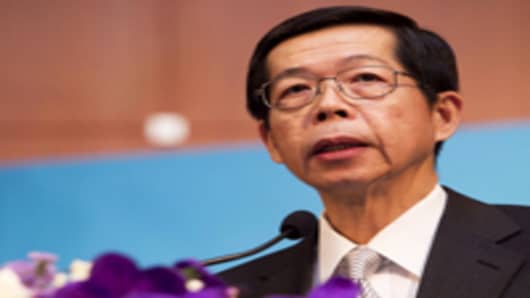Thailand's central bank chief played down a rift with the government over whether interest rates should be cut to stem a rise in the baht, saying rates were not the main factor and noting his primary duty was to ensure economic stability.
The baht has risen almost 3 percent against the dollar this year , to the alarm of exporters. Finance Minister Kittirat Na Ranong, who has periodically called for lower interest rates, said on February 5 that he sent the central bank a letter calling for a cut to discourage capital inflows.
Bank of Thailand Governor Prasarn Trairatvorakul told a briefing on Thursday that a "difference in views between the government and central bank is not unusual".
"But, in the end, it's a matter of how to resolve the issue constructively," he said, without elaborating.
Questions about currencies, and whether some countries are actively working to devalue theirs to gain a competitive advantage, are likely to dominate a meeting of Group of 20 finance ministers in Moscow on Friday and Saturday.
Thrusting attention onto the subject - and spawning talk of a currency war - has been the yen's sharp fall against the dollar as Japanese Prime Minister Shinzo Abe seeks to aggressively reflate his country's economy.
Kittirat has said Thailand's policy rate is too high and he wants to see more stability in the baht - meaning a reversal of its climb.
Still, he has also predicted the currency would eventually weaken as the government pushes ahead with spending $67 billion on infrastructure projects over the next seven years.
(Read More: South Korea, Thailand Warn over Fallout From Easy Money, Currencies)
While Kittirat has acknowledged the Bank of Thailand (BOT) is independent, he said in his letter and elsewhere that the central bank had to take responsibility if its policies failed.
The baht has been pushed up by foreign inflows into Thai stocks and bonds.
However, it as weakened slightly and been relatively stable lately, and Prasarn said it was now getting back into line with regional currencies.
Prasarn repeated that "capital movements involve many factors. Interest rates are just one and not a major one. For Thailand, interest rates are not a key factor."
Political Pressure
The BOT's monetary policy committee is meeting on February 20. Most economists continue to expect no policy change that day as the economy is growing well, although speculation about a rate cut has grown since Kittirat sent his letter.
"While there is political pressure to ease policy rates, we do not think this will be sufficient to prompt the BOT to ease monetary policy further, given the current macro fundamentals," said Santitarn Sathirathai of Credit Suisse in Singapore.
Another economist, Gundy Cahyadi at OCBC in Singapore, said the minister's pressure might still have some longer-term effect.
"While the rhetoric from Governor Prasarn seems to be less hawkish than previously, we still think there is a good chance that the central bank will raise its policy rate this year," he said. "But any move in the near term is highly unlikely, especially considering the persistent political pressure in favor of further easing," Cahyadi said.
(Read More: Highest Thai Inflation Since November 2011 Means Rates on Hold)
The seven-member MPC - three central bank officials and four outsiders - unanimously voted to leave the policy rate unchanged at 2.75 percent for a second straight meeting on January 9, taking the view that economic conditions had improved.
In a split decision in October, the committee surprisingly cut the rate by a quarter of a point, due mainly to global economic risks.
Prasarn said the committee's decisions on rates depend on "how each member assesses the economic situation and indicators".
As the central bank believes inflation is under control, it has room to keep interest rates low.
The BOT has forecast economic growth of 4.9 percent this year, close to the country's full potential rate.
The central bank predicts headline inflation should be 2.8 percent this year with the core rate, which excludes fresh food and energy prices, at 1.7 percent, well within its target range of 0.5-3.0 percent, which it sets policy to achieve.


